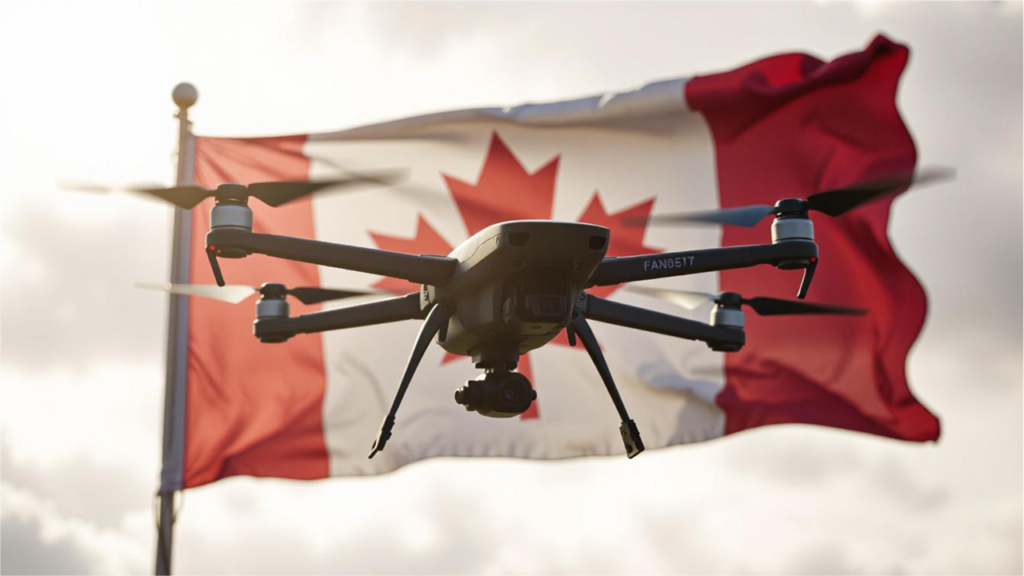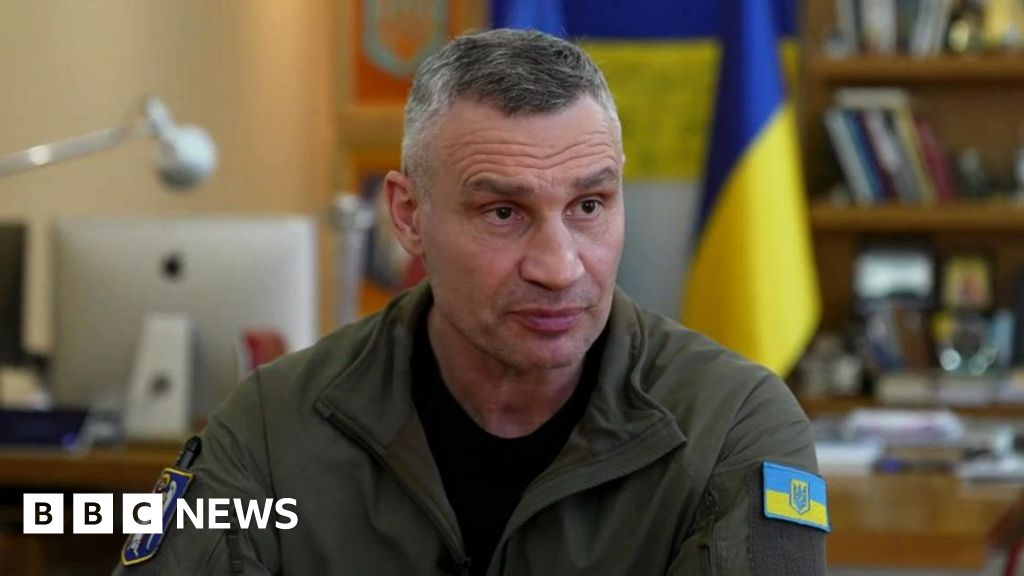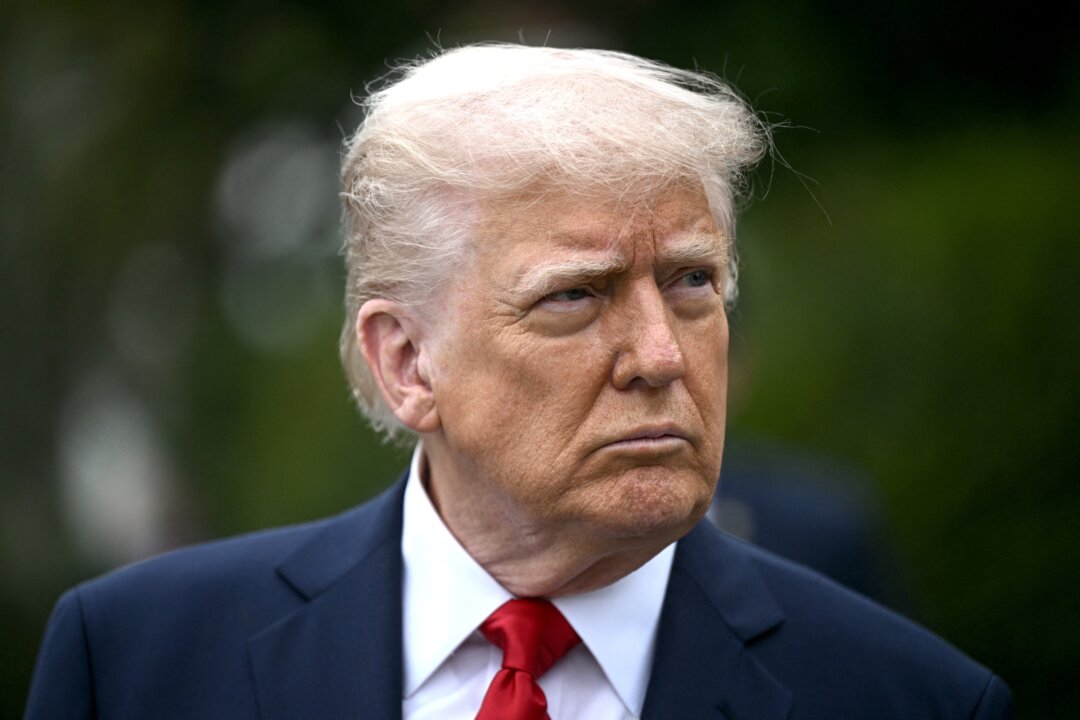Food poisonings cast shadow over Indonesia’s free school meals
Koh Ewe and Hanna Samosir
BBC News
Reporting fromSingapore and Jakarta

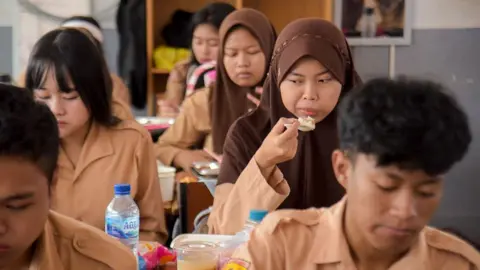 Getty Images
Getty Images
Indonesia is on an ambitious mission to offer free meals to 80 million school children – but that hasn’t exactly gone according to plan.
Nearly 80 students across two high schools in Cianjur, south of the capital Jakarta, fell ill after eating the meals this week. Most of those who ended up in hospital have since been discharged.
This is the latest in a series of food poisonings that have been linked to the programme, a signature policy of President Prabowo Subianto.
Authorities investigating the case say the suspected cause is negligent food preparation. Samples from the vomit of students have been sent for lab testing, and police say they have questioned people handling the food, from cooks to packers to delivery workers.
A 16-year-old student told local media that the shredded chicken in the meal had an “unpleasant odour”. “I felt dizzy, nauseous and vomited,” he said.
Across the world, programmes offering free meals to students have proved to be effective in improving health, academic performance and attendance.
But Indonesia’s $28bn (£21bn) version – shaping up to be the most expensive of its kind – has become the target of food safety concerns and heated anti-government protests.
In February, when thousands took to the streets to protest at budget cuts, they aimed their ire at the hefty price of Prabowo’s free school meals: “Children eat for free, parents are laid off,” read one of their protest signs.
A campaign promise turns sour
A centrepiece of Prabowo’s presidential campaign last year, the free meals programme was pitched as a way to tackle stunting – a condition caused by malnutrition that affects a fifth of children below the age of five in Indonesia.
“Through this initiative, our children will grow taller and emerge as champions,” Prabowo said in 2023.
Since he took office last October, this programme, along with other populist policies like new houses and free medical check-ups, has earned him political points. His approval ratings stood at 80% after his first 100 days in power.
In the first phase, which began in January, free school meals have made their way to 550,000 students in 26 provinces.
While the programme is “well-intentioned”, Maria Monica Wihardja, a visiting fellow at ISEAS-Yusof Ishak Institute, told the BBC there has been “no evidence” of “widespread urgency” for free school meals.
According to a national survey in 2024, less than 1% of Indonesia’s households went at least one day without any meals in the past year.

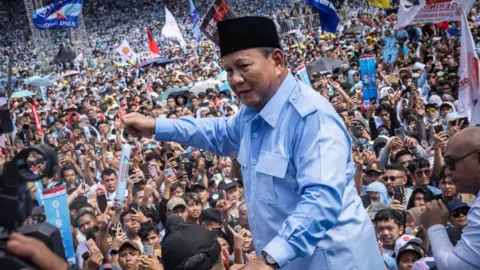 Getty Images
Getty Images
Since January, a series of food poisonings have raised apprehension about the free meals.
Michelle, an elementary school student in East Nusa Tenggara province, was one of several in her school who suffered suspected food poisoning in February. She told BBC Indonesian at the time that the food, which had given her a stomach ache, was “bland and stale”.
After the incident, some parents started preparing homemade lunches for their children instead, a school official told BBC Indonesian.
This week, after the food poisoning in Cianjur, authorities have promised to step up food safety processes.
“We must improve quality,” said Dadan Hindayana, head of the National Nutrition Agency, who had visited the students in hospital.
“One obvious thing is the lack of mature and in-depth planning before this program was launched,” Eliza Mardian, a researcher at the Center of Reform on Economics Indonesia, told the BBC.
“The haste ends up sacrificing quality and effectiveness, which actually worsens the public’s perception of this programme.”
The $10bn bill
The cost of the programme has not helped matters.
Indonesia has set aside more than $10bn this year for the free school meals.
By comparison, India spends $1.5bn a year to feed 120 million children in what is the world’s largest such programme. Brazil’s version costs about the same and serves some 40 million students.
To foot the steep bill in Indonesia, Prabowo has urged the country’s tycoons to help, and accepted a funding offer from China.
He also ordered $19bn in cuts to pay for it, along with other populist schemes – which made it especially controversial.
Several ministries, including education, had their budgets slashed by half. Bureaucrats who were not furloughed alleged they were forced to scrimp by limiting the use of air conditioning, lifts and even printers.
University students were furious as news spread of cancelled scholarship programmes and disruptions to their classes.
“The worst thing is when the stomach is full, but the brain is not filled,” Muhammad Ramadan, a student protester in Bandung, told BBC Indonesian – referring to Prabowo’s school meals plan.

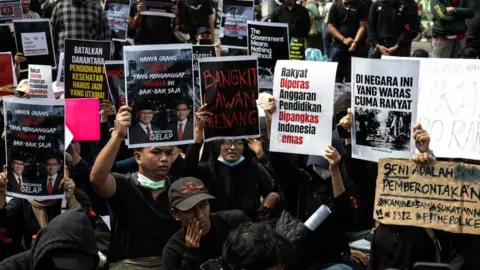 Getty Images
Getty Images
There could be more challenges ahead, such as allegations of budget mismanagement, which have begun to emerge after Indonesia’s anti-graft bureau flagged a “real possibility” of fraud in March.
Police launched an investigation this month after a meal provider in south Jakarta accused authorities of embezzlement, saying that she has not been paid since her kitchen started preparing school meals in February.
Prabowo, who has continued to defend the programme, said this week that his administration will “handle” the allegations and “safeguard every cent of public money”.
Experts, however, say the problem runs much deeper.
Large-scale social assistance programmes in Indonesia have historically been “riddled with corruption”, Muhammad Rafi Bakri, a research analyst at Indonesia’s audit board, told the BBC.
“Given the sheer size of the budget,” he said, “this program is a goldmine for corrupt officials.”
With reporting from BBC Indonesian


